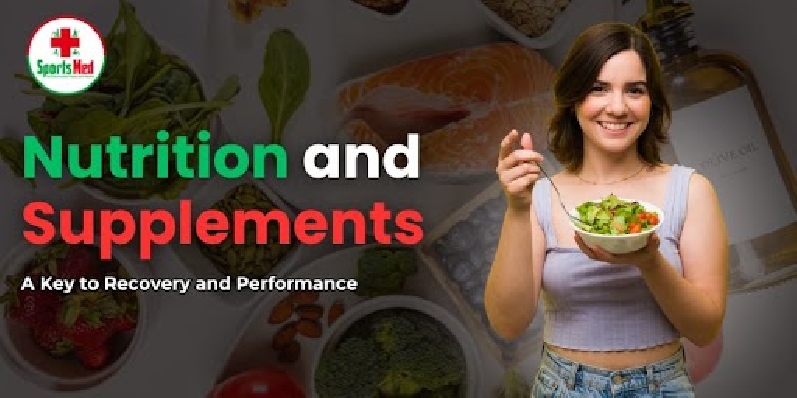
Nutrition and Supplements: Fueling Performance in Athletes
Adequate dietary intake and supplementation have a direct impact on sports performance. At every level, whether a professional athlete or an amateur, nutrition has the power to elevate or derail your performance. We'll look at how modifying the nourishment you give your body can help you maximise your athletic performance today in this article.
1. Macronutrients' Function in Athletic Performance
To perform at their best, athletes need a balanced intake of the three macronutrients:
Carbohydrates: The primary energy source for your body is carbohydrates. They are crucial for high-intensity exercise and endurance activities. Being complex, they provide slow-releasing energy. For instance, whole grains, fruits, and vegetables sustain an athlete's energy over time.
-
Proteins: Protein is essential for the repair and restoration of muscle tissue following strenuous exercise. For any athlete, eating foods high in protein, such as fish, eggs, lean meats, and legumes, will improve strength and muscular growth. Plant-based athletes mostly get their nutrients from foods like quinoa, lentils, and tofu.
-
Fats: Healthy fats are another significant source of energy for endurance sports. Nuts, peanuts, avocados, and oily seafood are great sources of vital fats that support general cellular function and give energy.
2. Hydration: The Cornerstone of Athletic Performance
The only way to prevent fatigue, cramps, and injury is through proper hydration. Athletes should hydrate adequately before, during, and after a workout.
-
Water: This is essential for maintaining your body's optimal temperature and ensuring lubrication, allowing oils to flow smoothly in your joints. Good hydration enables your muscles to function effectively.
-
Electrolytes: These include sodium, potassium, and magnesium, which are lost through excessive sweating during intense training. Replenishing these electrolytes helps maintain fluid balance in the body and supports muscle function. Natural sources for replenishing electrolytes include sports drinks, coconut water, and bananas.
3. Vitamins and Minerals: Micronutrients for Maximum Performance
Vitamins and minerals that generate energy, support strong bones, and help prevent injuries.
-
Iron: Iron facilitates oxygen transport in the blood—an endurance athlete's best ally. Foods rich in iron include red meat, beans, and spinach.
-
Calcium and Vitamin D: Calcium and vitamin D are fundamental to a diet that promotes healthy bones and prevents injuries. Some of the best sources are dairy products, fortified plant milks, and sunlight.
4. Top Supplements to Boost Athletic Performance
While there are many requirements fulfilled by a well-balanced diet, supplements will certainly contribute to enhancement of performance, improvement in recovery, and muscle growth. Here are a few that would do the trick:
-
Protein Supplements : Be it whey, casein or plant-based protein powder, it is a supplement that repairs muscles after exercise when protein sources may not be available as whole foods.
-
Creatine: The science better understands and uses creatine for the enhancement of strength and muscle size, and best suits athletes competing in sports where short bursts of extremely intensive activity are required, such as sprinting and weightlifting.
-
Omega-3 fatty acids: This is derived from fish oil supplements. They are beneficial for anyone with inflammation, joint health, and health in the cardiovascular system. However, one may say it is especially helpful in endurance athletes.
5. Timing Your Nutrition and Supplements for Optimal Performance
Knowing when to fuel the body is as important as knowing what to eat. Timing can maximise energy, endurance, and recovery.
-
Pre-exercise: A carbohydrate-rich meal 2-3 hours before exercise is effective to provide long exercise with energy. For a simple pre-exercise snack, take something light like a banana or a protein bar half an hour before your session.
-
After the workout: The most important thing is that it's the recovery time. Within 30 minutes of a workout, a snack including protein and carbs (such as a protein shake with fruit) will restore muscles and replenish glycogen stores.
-
Supplement Timings: Creatine and BCAAs can be used before as well as after your workout to promote the recovery and endurance of your muscles. Vitamins and omega-3s need to be taken with food so that you can better absorb them within your system.
Conclusion
Fueling your body with the right nutrition and supplements can make a significant difference in your performance, recovery, and overall health. Focus on balanced meals rich in essential macronutrients, stay hydrated, and strategically use supplements to enhance your athletic potential. Remember, a healthy and well-fueled body is a strong and high-performing one!